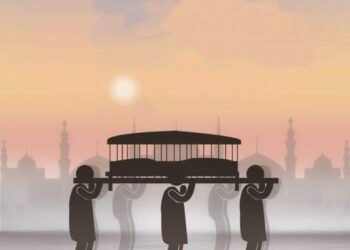When I read a few hours ago, that Malam Adamu, Wazirin Fika, died on a flight from London, where he had been receiving treatment, I felt really sad, that we’ve lost one of the genuinely venerable old men of Northern Nigeria. It’s without doubt, the closure of an era in our history. The Wazirin Fika would no longer be present amongst us to consult, when in doubt, about aspects of our history, as well as the nuts and bolts of the administrative structures, upon which some of the most impressive achievements in our history were recorded.
On that fateful morning of November 28, 2007, Chief Sunday Awoniyi died in an accident on the Abuja-Kaduna highway. To be double sure of the story, I placed a call to the Wazirin Fika. He answered me in words that conveyed very deep sorrow: “Yes it’s true, Modibbo, we lost Sunday”!
Chief Awoniyi had been the person that cemented my relationship with Malam Adamu. For those familiar with the old structures of life in the Kaduna of the past few decades, Wazirin Fika and Awoniyi, were inseparable. One was a channel to the other, and the two were repositories of all that people recall with genuine nostalgia; the era of dedicated labour, genuine service delivery, and patriotism that was a lived daily reality.
During my years as Editor of Daily Trust newspaper, we were working on a series of interviews with the old men, who had served during the years of the Sardauna of Sokoto, Sir Ahmadu Bello. When I got to the residence of Malam Yahaya Gusau in Kaduna, he refused to do the interview.
I placed a call to Chief Awoniyi, who advised me to stay in the residence. A few minutes later, he drove into the compound. Awoniyi asked me to follow him. Malam Yahaya greeted: “Ina kwana, Sunday”, and the reply was “Lafiya lau, Sir”. Awoniyi pressed further: “Modibbo said you have refused to do the interview, but you should sir”. Mal Yahaya turned towards me and replied: “Toh, if Sunday says I should do the interview, then you’re very lucky Modibbo”.
We did the hour-long interview, and headed for Malam Adamu’s residence. We were informed that he was slightly indisposed because he had returned from Fika late the previous night and was still in bed. Awoniyi went upstairs into Adamu’s bedroom, and a few minutes later, we were sat in the study for the interview.
Subsequently, it was a library that would be open to me, as it was to several other people; just as Adamu was always ready to offer very enlightening insights on administration, history, politics, and even social aspects of life.
A few years ago, a governor of our northern state had appointed over 250 personal assistants. People were surprised, I was too. I called Adamu to find out how many personal assistants were appointed by the Sardauna, when he ran Northern Region that eventually became the 19 northern states. He told me there was nothing like that in the Sardauna’s era, yet there was a consensus, that things were done much better then.
Adamu had a very distinguished life of service to our country, in several positions and was to retire as a very respected secretary to the government of the federation, SGF. Over the next couple of decades, he would continue to offer his remarkable insights to Nigeria, Northern Nigeria and his community in Fika, whenever he was called upon to do so. And because people knew that they would learn a lot from the venerable old man, they never stopped reaching him to tap from his wealth of knowledge.
It is part of the mythology of the northern system that almost all the top men from the time of the Sardauna retired into Kaduna, the old northern regional capital. It has always, therefore, been seen as a city of power and influence. Adamu was one the most respected members of that generation, and because Kaduna is one of the three cities that I call home, I’ve been able to see at very close quarter, the roles and positions of people like Adamu, and the culture they created and nurtured, with roots in the most important early years of Northern Nigeria.
Unfortunately, many of the venerable old people have died over the past few years, and the country itself has evolved in an increasingly different direction. The demography has changed, and the country is today a country of very young people. These young people are growing up in a world of neoliberal hegemony, which has devastated all aspects of life.
Our world today, and especially life in Northern Nigeria, now resembles the Hobbesian jungle, with life overwhelmingly “nasty, brutish, and short”. That’s not the world which formed Malam Adamu’s generation. They grew up in a world of transition, where older community values strongly influenced the formation of character, even while becoming educated within the certainties, if they ever were, of colonial society.
Many of the younger generation might not have even ever heard of his name. But Adamu, Wazirin Fika, represented some of the very best of those truly golden years of Nigeria’s development. Allah gave him a very long life, and allowed us to tap into the wealth of experience that he acquired over nine decades. In his passing, we arrived at what the old Fullo intellectual from Mali, Professor Hampate Ba, once said. The death of an old African is the equivalent of the burning of a library. Indeed, a major library has, literally, burnt, with the passing of our very dear Malam Adamu, Wazirin Fika. We are poorer with his passing. Allah ya jikan sa, ya gafarta masa, ya rahamshe shi. Amin.
Kawu, PhD, FNGE, a journalist and political scientist, writes via [email protected]




